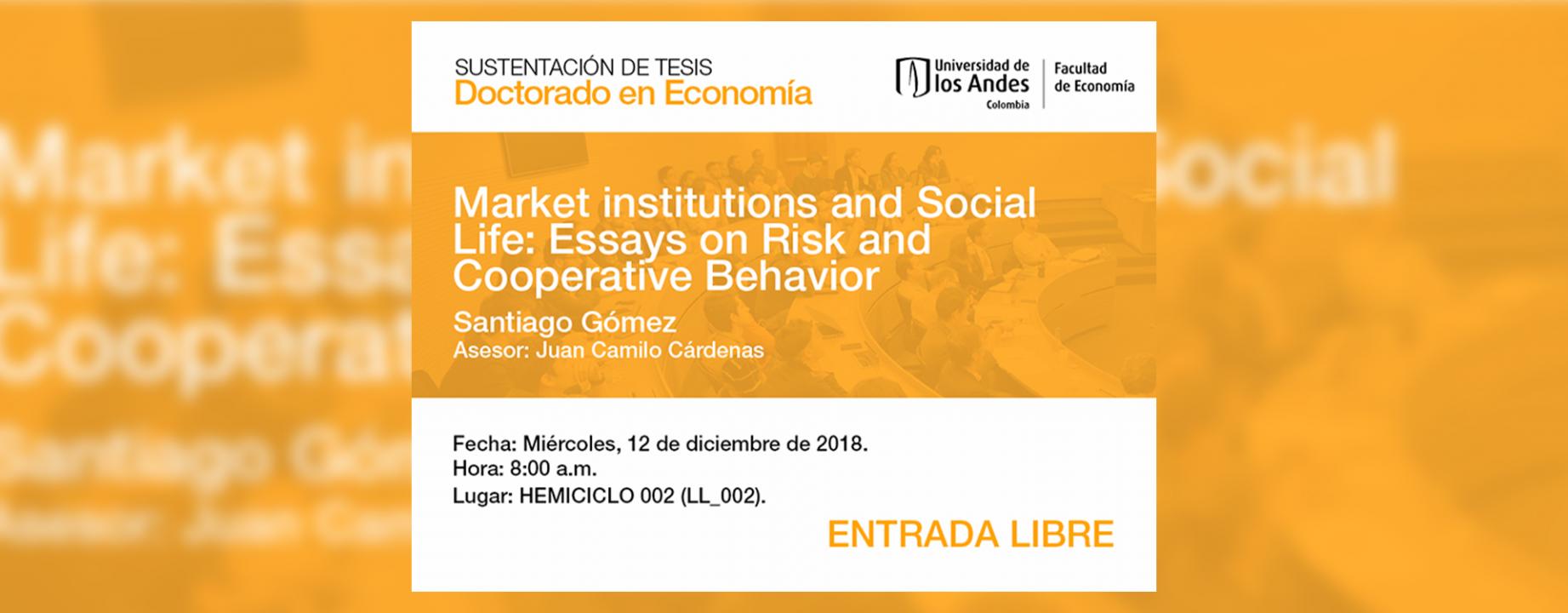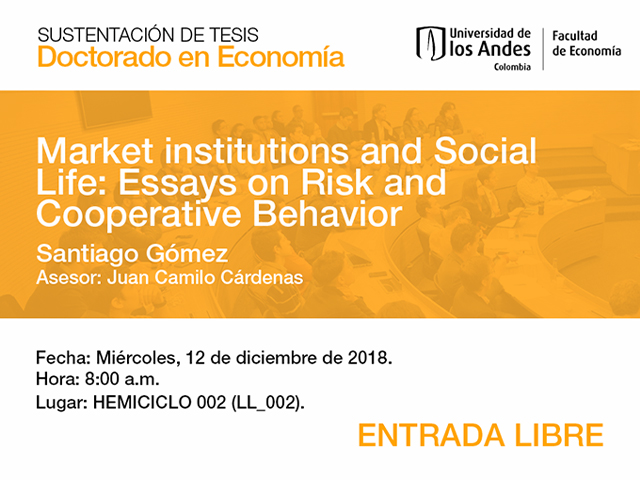Sustentación tesis doctorado

Basis Risk Effects on the Demand for Index Insurance. Experimental Games with Colombian Coffee Growers
Stephen Boucher[1], Santiago Gómez† and Andres Moya[2]
Index Insurance has been proposed as an alternative to providing risk management to small agricultural producers. Its lower costs and immunity to moral hazard and adverse selection are advantages over traditional insurance. Nonetheless, farmers can suffer production losses due to unexpected shocks and such losses not being recognized by the index insurance. This remaining risk is called basis risk. While difficult to measure empirically, basis risk is a primary suspect of the lower than expected take-up levels of index insurance in many contexts. There are two sources of basis risk. One due to productive risks not covered by the index insurance (I: non-insurable risks). Another due to impossibilities in correctly identifying when a covered event happens at the farm level (II: design risk). We show that these two sources of basis risk are not equivalent, neither theoretically nor in the reaction of farmers towards them. We apply a framed lab-in-the-field experiment to test farmers' valuation of index insurance under the presence of both sources of basis risk. In our sessions, farmers valuation of index insurance decreased under the presence of the design risk (II); and for low educated farmers, the higher proportion of coffee growers in Colombia, the valuation of index insurance increased when the level of non-insurable risk grew (I). These reactions are congruent with the level of variance reduction that index insurance achieves under the presence of each source of basis risk. These results call for a complete understanding of risk structure when designing an index insurance mechanism.
Credit Markets Substitution of Social Network Credit. Evidence from a Middle Income Country.
Santiago Gomez Cardona†
How do households balance the use of market credit and social networks when both are present at the same time? Do households undoubtedly favor the theoretically more efficient market institutions? As an approach to answer these questions, I test households ability to access credit markets when their social network is temporarily unable to provide resources. Using data from a middle-income country I provide evidence for rural and urban contexts using two different strategies. For rural contexts, I use intense rainfall events as an exogenous change in the ability of social networks to provide resources. Under the presence of negative shocks, households have increased credit access from formal and informal sources but mainly from social networks (family and friends). Nonetheless, when the household social network is also affected by a negative shock, social network credit ceases to be available and credit from formal and informal sources does not increase to compensate such loss. In a second strategy, I identify family networks. I show households reaction when receiving a shock at the same time that a shock affects their family social network. In rural contexts, the effects are similar to those found with the first strategy. Under the presence of a direct shock, households have increased credit access from informal and family sources. This access disappears under the presence of a shock in the family network but, at the same time, credit from friends sources increases. In urban areas, there is not increased credit access under the presence of direct shocks, but an increase in formal and friend credit sources when family networks are also affected by a shock. These results add evidence to dispute the idea that markets could completely displace other social network mechanisms that are theoretically not as efficient as markets.
Between-group competition enhances cooperation in resource appropriation games
Juan Camilo Cárdenas[3], Santiago Gómez†, César Mantilla[4]
Cooperation in public goods games increases in the presence of between-group competition. In this study, we validate the effect of between-group competition in a different social dilemma, a resource appropriation game. Unlike the voluntary contributions setting, group performance in this game increases with the exercise of a passive choice: not appropriating units in an open-access resource. We conducted an incentivized experiment using 276 undergraduate students in which groups of four subjects played a resource appropriation game. Different groups within a session were ranked in each round according to the group’s aggregate payoff. This ranking determined a group performance multiplier, which increased the payoffs in groups ranked above the median and decreased the payoffs in groups below the median. The multipliers were small enough to keep the individual benefits from appropriation larger than the individual benefits from a higher payoff multiplier (derived from an improvement in group ranking by not appropriating the resource unit). We found that implementing this small group performance multiplier decreased the average appropriation by 31%. This efficiency-enhancing device generated a 19-percentagepoint increase in overall earnings in a given session.
[1] Associate Professor, Agricultural and Resource Economics, University of California, Davis, United States. [email protected]
[2] Assistant Professor, School of Economics, Universidad de Los Andes, Bogotá, Colombia. [email protected]
† Ph.D. Student, School of Economics, Universidad de Los Andes. [email protected]
[3] Professor, School of Economics, Universidad de Los Andes, Bogotá, Colombia. [email protected]
[4] Assistant Professor, School of Economics, Universidad del Rosario, Bogotá, Colombia. [email protected]

